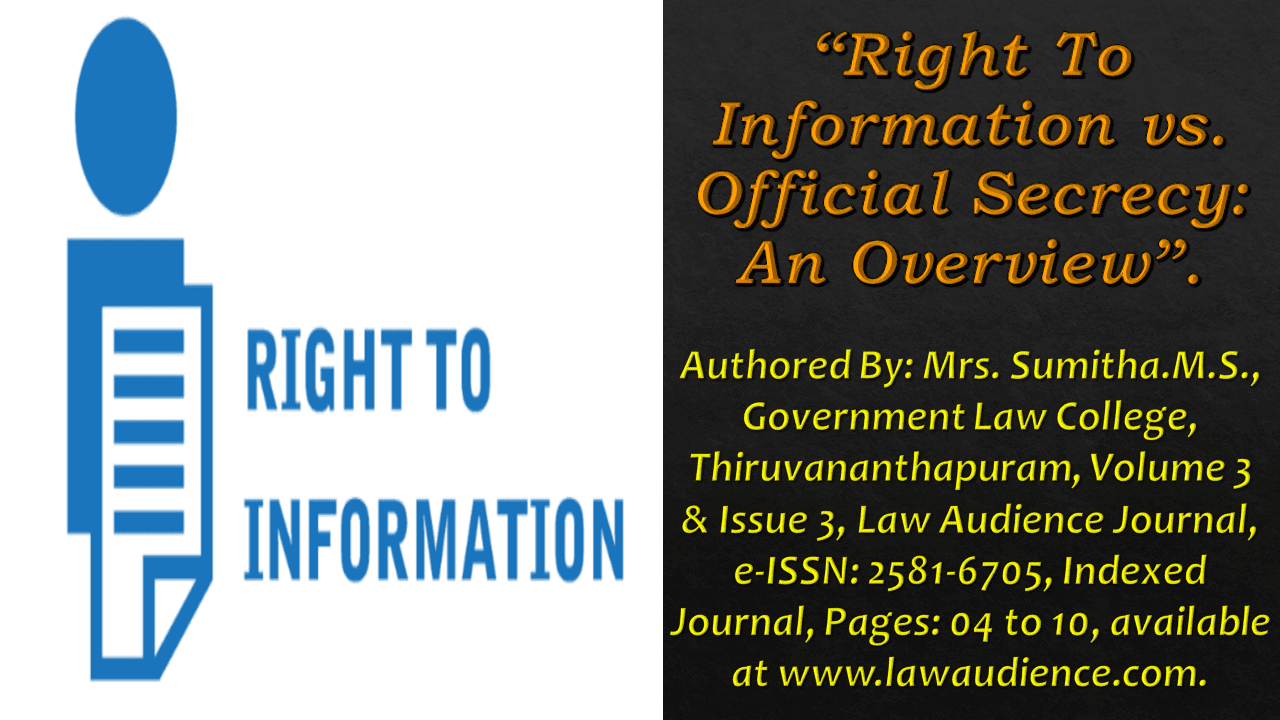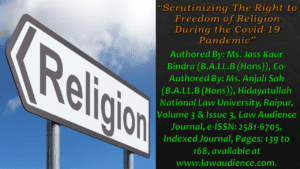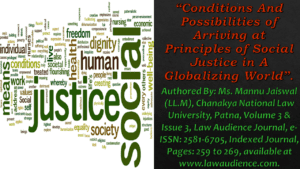Click here to download the full paper (PDF)
Authored By: Mrs. Sumitha.M.S., Government Law College, Thiruvananthapuram,
Click here for Copyright Policy.
I. INTRODUCTION:
India is one of the strongest democracies in the world with constitutional mandates such as the right to equality and the right to freedom. Democracy at its base level ensures participation of people which indirectly hints that people must be aware of the state affairs and measures by which they are governed. The struggle for access to knowledge was a universal demand during the post-Second World War era as it was presupposed to be one of the most valuable resources. Knowledge was synonymous with power, and the power includes liberty.[1] Equal access to knowledge has been an important issue in the struggle for social and economic equality.[2] Several International documents and many developed nations incorporated the demand in their charter and Constitutions respectively. The pioneer among them was the resolution of UN General Assembly wherein it was held that ‘freedom of information is a fundamental human right and the touchstone for all freedoms to which the United Nations is consecrated.’[3]
Indian judiciary also recognised the right to information as a concomitant of the fundamental right to freedom of speech and expression guaranteed under Art 19 (1) (a)[4] of the Indian Constitution. Legislatures also gave a positive node to this approach and satisfied the long-standing demands of people through various people’s movements with the enactment of the Right to Information Act 2005.
Meanwhile, it is imperative to remember that,- no right is absolute. Every right can be reasonably restricted. As we live in a civilised society, we are compelled to follow certain reasonable restrictions for the smooth conduct of the state and for getting equal protection to the rights of all the people. This is what jurisprudentially termed as duty. Those who enjoy the fruits of rights are bound to observe duty. Thus, the right to access information can also be limited in the interests of the sovereignty and integrity of India, the security of the State, friendly relations with foreign States, public order, decency or morality, or in relation to contempt of court, defamation, or incitement to an offence.[5] These limitations make us bound to observe Official Secrets Act 1923 in public interest. Public interest refers to any information which has reference to the functions of the State both domestic and foreign as well as matters relating to security, peace, vigilance and law and order.[6] The Act has also been used by countries such as the United Kingdom, Malaysia, Singapore, New Zealand, the US, Myanmar, etc to protect state official secrets.
However, the Act does not give any clear-cut boundary between information to which the common man can have access and those that are being protected under the Official Secrets Act, in return this ends up creating a phase of confusion. The State becomes confused between welfare and development since it is the duty of the state to safeguard its territory, sovereignty and to protect its people as a responsible father from foreign attacks and hazards. In pursuing the duty, State makes some crucial decisions affecting policy matters and matters relating to defence. This may sometimes be confidential. Here comes the conflict between the duty of a welfare state to inform its people about its each and every affair and the duty to maintain official secrets. Whereas, in such circumstances, people are also confused between their rights and duties. This dilemma frequently demands judicial intervention in determining whether a matter comes within the purview of the Official Secrets Act or not.
The judicial intervention into policy making of government often comes in conflict with the principles of Separation of Power which is one among the basic structure of our constitution. However, this cannot be used to justify the misuse of the Official Secrets Act which confers unlimited power upon the governing authorities. As Lord Acton said, ‘Power corrupts and absolute power corrupts absolutely’, secrecy is an indicator of absolute power or in other words, it breeds corruption. This is what was contained in the age-old saying that sunlight is the best disinfectant. Therefore, transparency must be observed as a rule and the Act should only be used sparingly with utmost caution.
II. WHAT IS THE OFFICIAL SECRETS ACT?
The Official Secrets Act 1923 was a colonial version of England’s Official Secrets Act, 1911 which gives absolute privilege to the Government in withholding information and official records. The enactment was meant to suppress the Indian nationalist feelings by curbing the then emerged powerful newspapers which were building a political consciousness among the people. According to Wade and Forsyth[7], the principal Act of 1911 was a hasty piece of catchall legislation. Section 2 of the Act confirms his finding by criminalising all unauthorized disclosure of official information. The provision was general in nature without giving any distinction between the information prohibited in the public interest and- so on. Thus, the legislation was an effort to totally deprive people’s participation in governance and is an antithesis to the idea of democracy and good governance.
The principal legislation suffered a huge flay in the famous Spycatcher Case[8], in which the House of Lords dismissed the appeal filed by the Attorney General against the publishers of memories of one retired British Security Serviceman, containing certain materials requiring confidentiality under the Official Secrets Act of 1911. Thereafter, the stringency of the provision got neutralised in England by the Official Secrets Act 1989.
Getting reflections from its colonial version, the Official Secrets Act 1923 also prohibits disclosure of information indiscriminately.[9] Section 3 deals with spying. Spying is a clandestine activity and it includes activities such as approaching or overseeing into any prohibited place and the making of any sketch or model or note relating to the matters found with a view to convey them to the enemy. It shall include anything and everything connected in the course of committing the offence.[10] The common intention behind the offence is to deteriorate the sovereignty or integrity of India or to disturb friendly relations with foreign countries. Once such communication with a foreign agent in suspicious circumstance got proved, ‘mens rea’ will be presumed against the accused.[11] If guilty, a person may get up to 14 years imprisonment, a fine, or both.
Section 5 prohibits the disclosure of information, which the government considers to be confidential. The civil service rules[12] also prevent civil servants from divulging official information. There is no clear definition for determining the content of the word ‘official information.’ But the word demands only narrow construction and is strictly limited to those aspects of governance, which need to be kept confidential for the time being. The recent tendency to over-classify documents or information as confidential results in creating unnecessary secrecy in administration and which will hamper openness in the system of governance affecting the concept of good governance.[13]
III. THE CONFLICT BETWEEN RIGHT TO INFORMATION ACT 2005 AND OFFICIAL SECRETS ACT 1923:
The Right to Information Act 2005 supersedes the Official Secrets Act 1923.[14] The Act outweighs public interest rather than those protections given by the Official Secrets Act 1923. Thus a Public Information Officer is at liberty to disclose any information in public interest except in cases where defence, foreign affairs, and public safety are involved. Further, Section 22 of the Right to Information Act provides that the Act’s provisions shall have effect notwithstanding inconsistencies contained in the Official Secrets Act or any other law or in any instrument having effect by virtue of any other law. The conflict is being resolved by applying judicial discretion. While seeking recourse on the judiciary, there comes another confusion as to whether these documents are amenable to judicial review or not. In other words, is there any privilege to withhold documents that exist in favour of government? At common law, courts were restrained from examining the document and can only pursue the collateral evidence in determining whether it pertained to the affairs of the State.[15] The position got changed in Conway V. Rimmer,[16] wherein the court held that it would inspect the document sought to be withheld if its disclosure was important for the disposal of a suit and its non-disclosure would defeat the cause of justice. Section 123 of the Indian Evidence Act also contains the old common law rule as to the non-amenability of privileged government documents before the judiciary. But section 162 of the same legislation adds that the validity of such a claim to non-disclosure of a document was to be decided by a court. In the case of State of Uttar Pradesh V. Raj Narain,[17] the Supreme Court held, the Court would decide whether the disclosure of a document would prejudice the public interest. Thus, the court advanced its earlier decision[18] that the privilege should never be claimed on the ground that the disclosure of the document would prejudice the State’s defence in a case.
IV. PAST USAGE OF OFFICIAL SECRETS ACT 1923 IN INDIA[19]:
- In 1985, 12 former staff members in Prime Minister’s Office and Rashtrapati Bhavan Secretariat were found guilty of entering into a criminal conspiracy with officials of the French, Polish and German embassies, communicating secret official codes, classified documents, and information pertaining to defence, transport, shipping, finance, planning, R& AW and Intelligent Bureau reports. (Coomar Narain Spy Case)
- Scientist S Nambi Narayanan was accused of transferring rocket and cryogenic technology to Pakistan for illegal assuagement. ( 1994 ISRO Spy Case) After 24 years, in 2018, the Honourable Supreme Court acquitted him awarding a compensation of Rs 50 lakh for implicating in a fabricated case. But the life-time insult faced by the veteran scientist cannot be compensated at any cost.
- In 2002, Iftikhar Gilani (Journalist from Jammu and Kashmir) was arrested as he was accused of having possession of documents relating to the deployment of the military in Kashmir valley. But later was released on the ground of the document not being secret.
- In 2011, Tarakant Dwivedi was arrested for reporting (Mumbai Mirror) about the leaking roof which was damaging the weapons in RPF armoury.
- In 2018, Former diplomat Madhuri Gupta was accused of spying for Pakistan’s Inter-Services Intelligence (ISI) when posted in Islamabad and sentenced to three years of jail.
- Attorney General of India recently requested invocation of Official Secrets Act against ‘The Hindu’ for using the “secret documents” relating to Rafael Deal. Thus the discussion, whether the Act is being misused to curb freedom of the press again comes to the forefront.
V. CRITICISM OF THE OFFICIAL SECRETS ACT 1923:
- Archaic and irrelevant: The legislation was a colonial product of the 20th century intended to suppress nationalistic as well as democratic movements. It is inconsistent with the democratic values enshrined in the Constitution. Also, many things under the domain of OSA are already in the public domain through other published works.[20]
- Draconian law: The law is silent in defining the word “secret”. It paves the way to misuse so that government can label any information or documents as secret at their own whims and fancies to muzzle democratic voices by establishing executive autonomy.
- Cultivates a culture of secrecy: The legislation is an attempt to create a culture of secrecy where confidentiality became the norm and disclosure an exception. This is an antithesis to the new world of faster communication with the political culture based on transparency.
- In contravention with Right to Information Act 2005: The Official Secrets Act is inconsistent with sections 8(2) and 22 of the Right to Information Act 2005.
- Misused for harassing journalists: Section 5 of the Official Secrets Act, which deals with potential breaches of national security, is often misinterpreted. This Section makes sharing information that may help an enemy state, a punishable offence. This section comes in handy for booking journalists when they publicize information that may cause embarrassment to the government or the armed forces. For example, Journalist Tarakant Dwivedi alias Akela was booked for criminal trespass under the Act in 2011 after he wrote an article about sophisticated weapons kept in a room with a leaking roof at the Chhatrapati Shivaji Terminus in Mumbai. After an RTI query that revealed that the area he had visited was not a prohibited area, the Bombay High Court dismissed the case.[21]
Similar is the recent allegation against the publisher of The Hindu newspaper regarding certain information which were alleged to be stolen from the government custody and contends protection within the ambit of national security.
VI. CONCLUSION AND SUGGESTIONS:
There is only a hairline difference of stake between information and secret. The former has nothing at stake whereas the latter has the stake of national security. It’s true that the Official Secrets Act is a breach of the fundamental right of citizens as well as curbing the freedom of the press. However, it saves our security details and other secrets from leakage and spying. Therefore, it is not advisable to cancel the legislation altogether and to be a victim of the rights we claim. It is only recommended to reform the legislation to meet the ends of the present era by reducing the scope of the Act giving protection to whistle-blowers and genuine journalists.
The Act is also in need of removing ambiguities, especially regarding the definition of ‘secret documents. The suggestions of the Second Administrative Reforms Commission Report, 2006 regarding the substitution of the Act by a chapter in the National Security Act can also be made use of if the Official Secrets Act in its present form is found to be in bitter conflict with the Right to Information Act 2005.
Cite this article as:
Mrs. Sumitha.M.S., Right to Information vs. Official Secrecy: An Overview, Vol.3 & Issue 3, Law Audience Journal (e-ISSN: 2581-6705), Pages 04 to 10 (28th December 2021), available at https://www.lawaudience.com/right-to-information-vs-official-secrecy-an-overview/.
Footnotes & References:
[1] S P SATHE, RIGHT TO INFORMATION,1st edn., LexisNexis Butterworths, New Delhi, 2006 at p 3.
[2] Ibid.
[3] United Nations General Assembly, resolution 59(1), 65th plenary meeting, 14 December 1946.
[4] Bennett Coleman V. India AIR 1973 SC 106.
[5] Article 19 (2) of the Constitution of India 1950.
[6] N.K. Acharya, Commentary on The Right to Information Act, 2005, 12th edn, Asia Law House, Hyderabad 2014 at p 115.
[7] Wade and Forsyth, Administrative Law, p 65 seventh edn, Indian Reprint 1997.
[8] Attorney General V. Guardian Newspapers (1990) 1 AC 109. See HM Seervai, Constitutional law of India, 4th edn, Vol 2, p 1647.
[9] Supra N1 at p 50.
[10] Supra N6 at p 142.
[11] Section 4 of the Official Secrets Act 1923.
[12] Central Civil Services (Conduct) Rules 1964 r 11 made under Art. 309 of the Constitution.
[13] Supra N1 at p 51.
[14] Section 8(2) of Right to Information Act 2005.
[15] Duncan V. Cammell Laird & Co. Ltd, (1942) AC 624.
[16] [1968] AC 910, [1968] 1 All ER 874.
[17] AIR 1975 SC 865.
[18] Amar Chand Butail V. India, AIR 1964 SC 1658.
[19] Ankit Dutt, Offsetting the secrets with information, Civil Service Times, May 2019 at p 24.
[20] Current Affairs, Civil Service Chronicle, May 2019 at p 25.
[21] Ibid.



